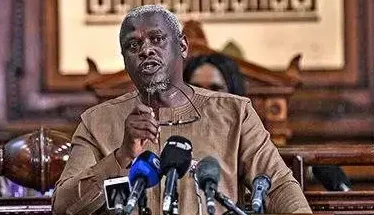ANC Free State chairperson Mxolisi Dukwana has bluntly addressed the damaging effects of internal power struggles within the party, cautioning that internal factions are sabotaging
renewal efforts.
Dukwana told Sunday World that those who cosied up to power often wield it with disdain for the very people they should serve.
“When the premier was elected to the office, there were people who thought that they were kingmakers,” he revealed, “wagging their tails and feeling that they were in charge of the government.”
Such attitudes, he insisted, corroded the party from within and obstructed the rise of leaders who genuinely dedicated themselves to public service.
Dukwana, who once served as the premier of Free State, paints a stark picture of a province still haunted by the apartheid past, yet grappling with new challenges under a democratic regime.
“Our people lived under extreme measures before democracy,” he asserts, “and when we got our freedom, they expected to see changes in their lives.”
But instead of progress, Dukwana warns, there is an alarming rise in anger and resentment among the populace – a sentiment that has infiltrated the very ranks of the ANC.
Dukwana also delved into the simmering outrage surrounding the food poisoning crisis affecting spaza shops, in which a number of children have died nationwide.
He posited that the crisis was a symptom of a broader societal breakdown, further worsened by the high unemployment rate and faltering social cohesion.
“Our people are angry because of things such as spaza shop issues, where kids die due to poisonous food,” he lamented.
Dukwana contended that the ANC’s inability to address these grievances
had left lasting scars on the party’s reputation.
“We never go back to the people to acknowledge our mistakes,” he admits, highlighting a troubling disconnect between the ANC and its constituency.
Dukwana implored the province’s leaders to mend fractured relationships with their communities.
“We need to be intentional with what we want to do and achieve for our people,” he stressed, advocating for improved communication and a concerted effort to earn back
public trust.
The path to renewal, as outlined by Dukwana, required bold confrontation with internal party divisions.
He emphasised the necessity of self-introspection among ANC members, urging them to shun factionalism and personal vendettas in favour of unity.
“We need to deal with trust within the ANC,” he demanded, “and among party members.”
Dukwana didn’t shy away from acknowledging the uphill battle ahead.
“Change is a painful process,” he conceded, predicting resistance from those who benefit from the status quo.
Yet he remains resolute in his belief that the ANC must undergo this transformation to restore its dignity and efficacy.
Ultimately, Dukwana said, the message is not one of personal ambition but of collective responsibility. “What is important is that we need growth and deal with issues that have been bad for us.”
His vision is clear: to salvage the ANC’s integrity and establish more effective ways of serving the people.



